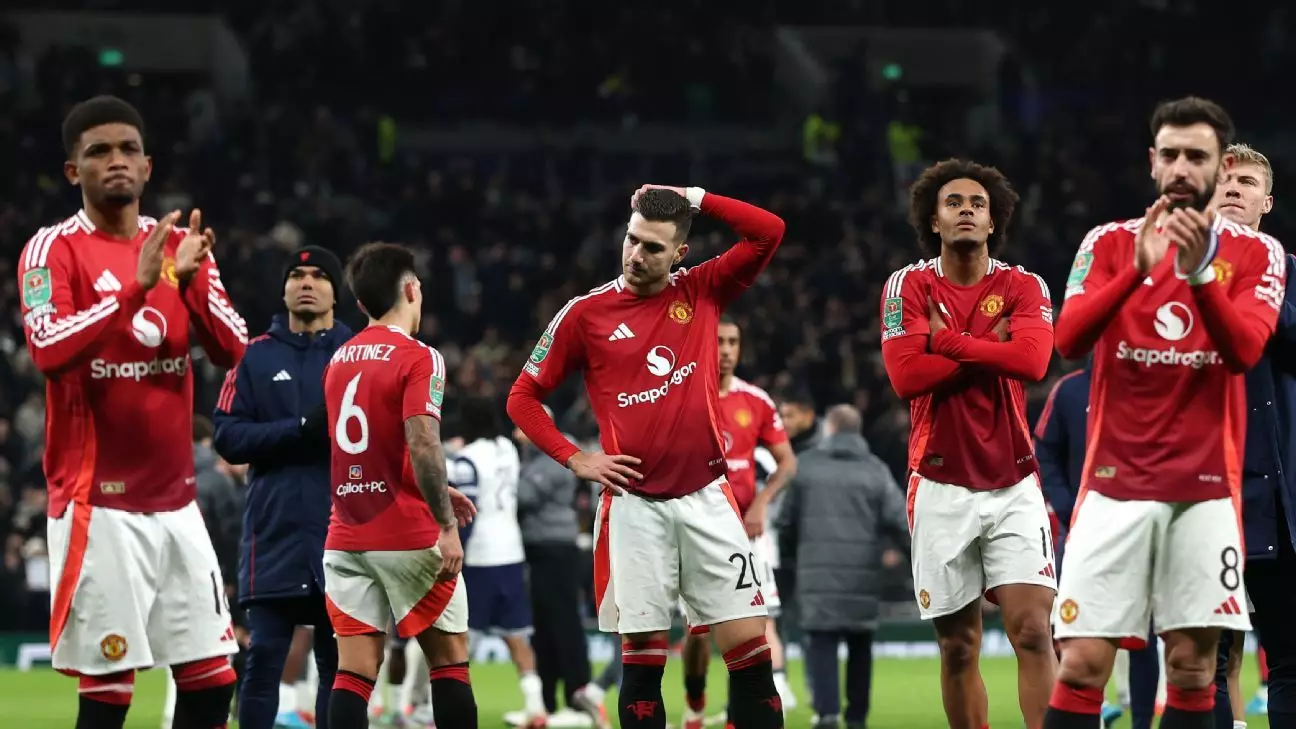In a thrilling confrontation that highlighted the unpredictable nature of football, Tottenham Hotspur edged out Manchester United in the Carabao Cup quarter-finals, clinching a 4-3 victory. This match was emblematic of the rollercoaster journey both teams have been on this season. Following the game, there were lessons to learn, aspirations to pursue, and criticisms that echoed from the stands.
Tottenham Hotspur began the match with promise, as Dominic Solanke put them ahead early in the first half. His well-calculated shot that found the near post set an optimistic tone for Spurs. However, as the half progressed, it became evident that Tottenham’s dominance was far from assured. Despite leading, they allowed United to dictate much of the play. United played with urgency but lacked the finishing touch and were let down by poor execution when it mattered most.
The first half underscored a recurrent theme for Spurs: inconsistency. While they managed to score and maintain a slender lead, their overall performance was shaky, revealing vulnerabilities in both defense and midfield. Such lapses in concentration could have proved costly against a United side known for their capacity to strike back when the situation demands.
The second half erupted into chaos as Spurs initially extended their lead through Dejan Kulusevski and Solanke, pushing the score to 3-0 within minutes. This quick succession appeared to confirm Tottenham’s superiority. However, the manner in which they lost control was alarming.
United responded with tactical changes that rejuvenated their attack. The introduction of Joshua Zirkzee, Amad Diallo, and Kobbie Mainoo shifted the momentum significantly. Zirkzee capitalized on a critical mistake by Spurs’ goalkeeper, Fraser Forster, whose errant pass led to a simple goal. Amad swiftly followed up, punishing another error from Forster, and suddenly the match was a contest once more, 3-2.
This frantic back-and-forth demonstrated the unpredictable nature of knockout football. Tottenham was left teetering on the edge, revealing a lack of composure under pressure. These moments highlighted the importance of mental fortitude, as they still had the means to hold onto their lead yet almost crumbled.
Despite the tension, it was Tottenham’s ability to respond at crucial moments that ultimately secured their win. When Altay Bayindir, United’s goalkeeper, misjudged a corner, Heung-Min Son capitalized, restoring the two-goal advantage just when it seemed Spurs were faltering. It underlined how crucial decisive moments are in high-stakes games.
However, issues persist for both teams. For Spurs, Postecoglou’s philosophy of attacking football clashes with the evident need for defensive stability. The fact that they lost a 3-0 cushion exemplifies systemic issues in the squad, leading to critique of the manager’s tactics. Conversely, United’s manager, Ruben Amorim, must confront the limitations in his squad’s depth, particularly in finding reliable goalscorers.
Amorim’s strategy had its merits, but failing to capitalize on the intense pressure and the gifted opportunities ultimately cost United dearly. Lessons about composure and execution need to be heeded if they are to rebound from a disappointing outing.
In the backdrop of this clash, Tottenham’s fans vocalized their frustrations towards Chairman Daniel Levy and the club’s ownership. After years of stagnation in pursuit of trophies, the pressure grows palpable. Even as Spurs edged closer to a semifinal, questions loom over the club’s direction and strategies under the existing regime.
Fan sentiment, particularly in high-pressure moments like Thursday’s match, illustrates a broader narrative. Postecoglou’s attempt to instill a new identity must coalesce with the supporters’ expectations for glory, especially after 16 long years without a trophy. However, it is vital for the club to adopt a progress-oriented mindset, avoiding knee-jerk reactions to performance fluctuations.
Tottenham’s 4-3 victory is a testament to the unpredictable landscape of football—a whirlwind that offers both hope and concern. While they reached the semifinals and displayed moments of brilliance, the underlying issues need addressing. Postecoglou must navigate not just results but the expectations that follow. The pathway to success is not merely paved with aspirations for silverware; it requires consistency, stability, and a vision that aligns with the club’s illustrious history.
As the pressure mounts ahead of their next fixtures, fans and management alike will be left to ponder whether this high-stakes rollercoaster can stabilize into long-term triumph, paving a brighter future for Tottenham Hotspur.

